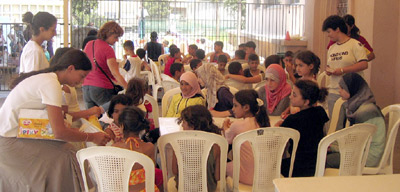The frightened, protective Muslim mother finally agreed to let Christian medical workers take her sick 2-year-old daughter to the hospital.
 Lebanese Baptist volunteers serve children of refugee families at the Beirut Baptist School. The fighting in Lebanon has brought thousands of Muslim refugees into the city – and into contact with Christians they might never otherwise meet.
Lebanese Baptist volunteers serve children of refugee families at the Beirut Baptist School. The fighting in Lebanon has brought thousands of Muslim refugees into the city – and into contact with Christians they might never otherwise meet.“If you send me with one of your people, I am ready to go with her,” the Shiite woman told the Christians at Beirut Baptist School, where she has found shelter for her family from the fighting that raged near her home.
Then, from behind the black veil that completely covered her face, she quietly spoke these words: “Please, pray for my daughter.”
Amid the darkness and suffering of war, a ray of light is shining in Lebanon.
For weeks, Lebanese Baptists and other Christians have been housing, feeding – and loving – hundreds of mostly Shiite Muslim families driven from their homes in Beirut’s southern suburbs and towns farther south by the battles between Hezbollah guerrillas and the Israeli military.
During normal times, the two groups might never encounter one another, much less form friendships, in Lebanon’s uneasy mix of religious and ethnic factions. But these aren’t normal times.
While Lebanese Baptists help refugees in Beirut, Southern Baptists in the region are channeling nearly $50,000 in aid to Lebanese Christians to provide food, medicine, blankets and other supplies to families fleeing the fighting in the south. Baptists in Israel also are assisting people in need in northern Israel, where Hezbollah rockets continue to fall.
Up to 750,000 Lebanese have been displaced by the war so far. Many of them have flooded into hundreds of schools and other temporary shelters – including the Beirut Baptist School and the Arab Baptist Theological Seminary in Beirut. Some 1,000 refugees are living at the two schools until they can return to their homes.
Southern Baptist aid
“The biggest needs right now, without a doubt, are food, medicine, pallets to sleep on and blankets,” said a Southern Baptist in the region working to channel the aid funds to Lebanese Christian workers. “Once we have a good handle on those top three needs, we’re looking at trying to provide more clothing, toys for children and such.
“The money so far has been used to buy items like milk powder for babies, bread and medicine for people with diabetes and heart trouble and for children with fevers. Local Christians designated a whole section of schools that were housing families who had fled from the south and took food, medicine and cots to them.”
But aid deliveries in the days to come will involve more than just food and medicine, the Southern Baptist noted.
“Our dream is that more and more local believers will start going in to sit with people, to talk with them, to cry with them, to pray with them,” she said. “The Shiites are the majority in Lebanon. God literally has propelled these Shiite families up north and put them in villages where there are followers of Jesus. He’s put them smack-dab next to each other, and it’s going to be neat to see how Christians respond.”
She asked for prayer for civilians trapped in the south, where fighting rages on.
“Ask God to show mercy to the families who have not been able to flee, who are in dire need of medical help,” she appealed. “These villages where the fighting is going on are made up of just ordinary people. Many of the mothers have upwards of eight to 10 children.”
Israel suffers, too
In Israel, Baptists and other believers also are helping the hurting. Hundreds of thousands of people have sought safety in bomb shelters as Hezbollah forces in Lebanon continue to fire rockets into northern Israel. Many more cannot work regularly or provide for their families until the bombing stops.
The Baptist Village camp near Tel Aviv has provided a haven to a number of Israeli children from the north, giving them some relief from the daily tension and fear back home.
Christians also are seeking to aid Israelis who need food and other assistance in the northern war zone.
“We’re praying that the Christian believers’ lights will shine brightest in the midst of this difficult time. It’s a hard thing, because here believers are in the army and some have to go to Lebanon. We know of one believer who had to go in and remove wounded soldiers under fire. I asked another believer who got called up to service how I could pray for him, thinking he would just ask to come back home safely. He said, ‘Just pray that I do my job, but that I don’t have to use my gun.'”